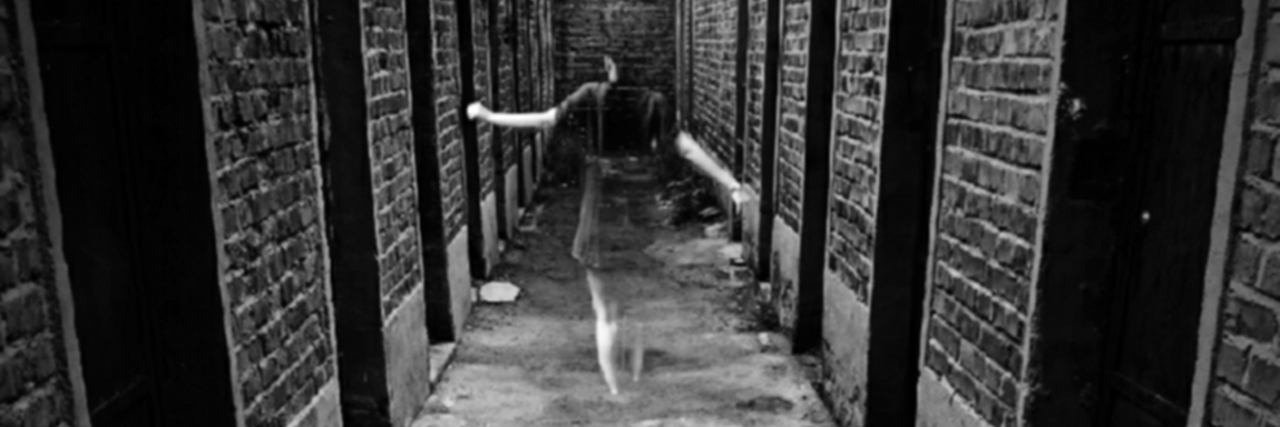When My Invisible Disabilities Make Me Invisible
Not all disabilities are visible, but feeling invisible because of your disabilities is a particularly isolating kind of pain.
• What is Ehlers-Danlos Syndrome?
• What Are Common Ehlers-Danlos Syndrome Symptoms?
No matter how many quality friends I have, or how close I am with my family, I almost always feel invisible. I’m the person with the service dog who gets questions about whether I’m training him for someone else, and then sees the befuddled looks when I state that he is my highly trained service dog for my own disabilities. Because my panic attacks and PTSD episodes can be so extreme, I tend to hide somewhere on my own to have one. My own dad had never seen me have a panic attack until a few months ago, despite the fact I’ve been having them for eight years.
I get up every morning, get dressed, take my service dog for a walk and head to work. While I’m at work I am productive and efficient. I lead meetings, write articles and coordinate events. The only indication anyone has that I am disabled is my furry companion next to me throughout the day. One of the things he is trained to do is to alert me when I stop breathing, as this is a precursor to a panic attack. I was in the middle of an important event one day when he alerted. One of the doctors I worked with asked me what happened, and if he just wanted to play. When I told him I had stopped breathing, the look on his face was priceless as he stammered “but… you didn’t look like you were in distress!”
That’s the catch. I can get to the point where I start to pass out and no one notices, other than my service dog.
My struggles go far beyond PTSD and psychiatric disabilities, though. For as long as I can remember I have been in pain. I remember crying because my neck hurt while I was still in a high chair. I did not find out that I have Ehlers-Danlos syndrome until recently, but now it finally makes sense. I could never compete in sports or PE because my chronic pain held me back. I heard from classmates and PE teachers and others to “push through it” and “just participate” and that no matter how much my body screamed, I couldn’t be excused without a doctor’s note. Even when I would tell people I was awake in the middle of the night at 14 because my pain was so bad, none of my friends could understand.
It is a little easier as an adult because I get to control what I do. Sometimes, though, I want to keep up with friends on a hike. At 24, that shouldn’t be such a tall order. My friends have no concept of how bad I am hurting, and I am glad for them! I just wish there was some way to communicate the feeling of your bones trying to rip apart from each other as your muscles spasm and lock in an attempt to hold everything together. It’s not fun, and feeling like your friends see you as just being out of shape because of it is humiliating.
Not all disabilities are visible, but sometimes that makes me feel invisible. I have developed an extremely high pain tolerance. This means that when I went to the emergency room for a dislocated shoulder I couldn’t fix on my own, my sky-high blood pressure was the only thing that betrayed just how much pain I was really in through my joking with the doctors.
No one can look at me and see on the surface what is really going on. I can go out for a perfectly pleasant dinner with friends, all while feeling like my body is on fire. I can listen intently to my friends while I’m on the verge of a panic attack, or telling myself that I’m not going to die because of my pounding heart. I usually don’t say anything about it, because I don’t want to be seen as the person who always has something wrong. The problem is that then I feel like no one can see me.
This leaves me feeling like I have to scream at the top of my lungs in a crowded room saying “please see me, please hear me, please help me.” I get pushy, I get forceful, I become desperate because I just want someone to understand how badly I am hurting. But even my screams tend to be nearly silent and therefore easily overlooked.
The best way for family and friends to support me with my complicated and numerous struggles is to ask me questions, listen openly, and believe me. Ask how I am really doing, how my pain is, how my anxiety is. This gives me the permission to let you into my world just a little bit, even if it’s for a short time. Listen to me and give me space to talk. When you allow me the freedom to express whatever I need to and even ask a follow-up question, it lets me feel like I am not so alone in this battle. And please, please believe me. If anything I tend to downplay my struggles — I never exaggerate them.
Please believe that I really do feel this way for a reason. Please understand that I need you to see me in that instant, and your belief helps me feel less alone. My disabilities may not be visible, but you can help me be seen.
Getty image by Dogbitedog69.

